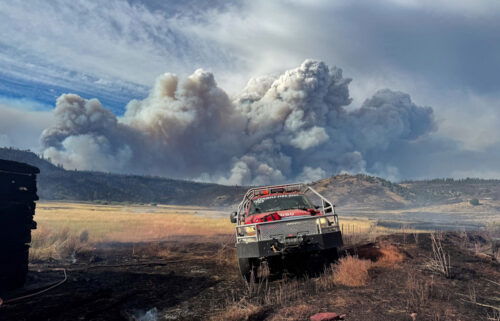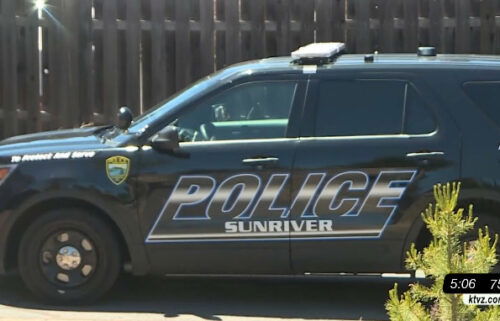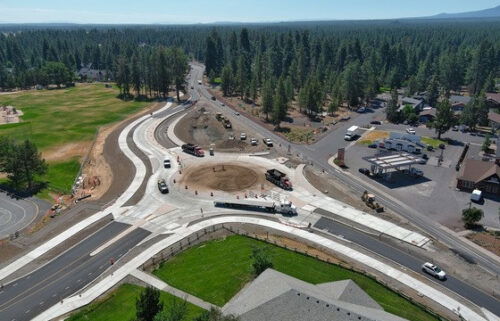Fortified synagogues and guards ‘everybody knows.’ How life changed a year after the Tree of Life massacre
During a sermon inside a New York synagogue last month, Rabbi Joshua Davidson recounted all the ways his synagogue has changed since last October.
“The boulders on the sidewalk, the scanners, the security guards… We have become a fortress,” he told the Temple Emanu-El congregation.
Last year on October 27, eleven worshipers were fatally shot and several others wounded inside the Tree of Life synagogue in Pittsburgh’s Squirrel Hill neighborhood. The effects of the deadly hate crime have rippled throughout the country since.
In Atlanta, Eric Robbins, whose hometown is Squirrel Hill, says his synagogue is now armed with SWAT teams during high holidays.
“Judaism, our seam is to be radically welcoming,” Robbins, president of the Jewish Federation of Greater Atlanta, says. “And at the same time we’re having that security conundrum that challenges that.”
Last year’s attack is believed to be the deadliest attack on the Jewish community in the history of the US, the Anti-Defamation League says. It came amid an already alarming rise in anti-Semitism.
“It woke a lot of people up to their heritage, to their family,” Robbins says. “There’s an absolute rise in fear but there’s also an absolute rise in resilience. People are not staying away from synagogues and there’s a rise in pride, in being Jewish.”
The cost of safety
Securing institutions was still in the works before the shooting, says Jeffrey H. Finkelstein, the president and CEO of the Jewish Federation of Greater Pittsburgh. The federation decided to hire a security director in 2016 to conduct active shooter training by teaching congregants about run, hide and fight techniques. He also suggested adding at least one phone inside synagogues — something which is usually not allowed — and unblocked some of the building’s exits.
All three things saved lives the day a shooter walked into the Squirrel Hill congregation.
“We had 75% of institutions who bought into what we were doing prior to the attack,” he says. “Now, it’s 100%. Everyone is focused on it.”
To keep up with “newly realized security concerns,” some synagogues have had to raise funds and divert their attention from learning and cultural programs that would help enrich and improve their communities, says Rabbi Aaron Bisno, from Pittsburgh’s Rodef Shalom Congregation.
Money for security has gone toward both one-time cost physical upgrades, like panic buttons, as well as ongoing expenses like hiring of personnel, he says.
The city’s Jewish federation has helped. It allotted more than $600,000 into buzzer systems that aid with access control as well as panic buttons, serving as a quick link to 911 dispatchers. And in the first weeks since the attack, the federation spent about $120,000 hiring armed guards for every Jewish institution in the area.
“We knew we needed to do that, to build resiliency in the community,” he says.
Today, he says many of the institutions continue to maintain a full-time or part-time security guard they didn’t have before last October.
Robbins says many local synagogues his Atlanta federation works with have also now added armed guards and metal detectors. Communities have gone into a somewhat safety “overdrive,” he says.
But security isn’t cheap, he says.
“And you don’t take it away once you added it.”
‘The definition of terrorism’
The community’s fears aren’t irrational.
Anti-Semitic incidents remained near historic levels last year, an Anti-Defamation League report said, citing 1,879 attacks against Jews and Jewish institutions across the country.
In April, one woman was killed in California and three other people were injured after a shooter walked into a Poway synagogue.
And in September, New York police said more than half of the hate crimes reported in the city were anti-Semitic, mostly acts of vandalism. There were 152 reports of hate crimes targeting the Jewish community, NYPD statistics show, compared to 93 the same period last year.
“Today, certainly, we’re very much feeling the threat of anti-Semitic violence,” says Rabbi Davidson, who leads the New York synagogue. “The hate manifestos that perpetrators have left behind have been laced with anti-immigrant language. They’re out for anybody that’s different.”
The threat looms large enough that many Jewish Americans avoid wearing things that may reveal their religious Americans, a recent poll by the American Jewish Committee found.
That’s a tough reality to confront for many synagogues, who take pride in their usually welcoming and open-door environment.
Making access difficult runs “completely counter to who we want to be,” Davidson says.
“And that’s the definition of terrorism, it prevents you from being who you are because you have to live with these concerns.”
It’s a balance many synagogues have begun to find, Finkelstein says. The guard who stands outside his synagogue, “everybody knows.”
“He’s like a big teddy bear, he’s not Jewish, but when you walk by he says ‘Shabbat Shalom’ on Shabbat in Hebrew,” Finkelstein says. “And he’s family now.”
The sense of comfort with the new adjustments around Jewish institutions continues to grow, he added.
“I haven’t heard many stories of people saying I’m not going because I’m scared.”
In fact, it often seems congregants are gathering like never before. High Holiday attendance has been good, Finkelstein says, and despite the upped security, all Jewish leaders CNN spoke to say the overarching emotion that has settled into communities is resilience.
What it really means to be secure
“What’s real significant, and the reason people remember Pittsburgh is … how this whole community responded,” Rabbi Bisno, from the Rodef Shalom Congregation, says. “This was the first time there was an attack on Jewish houses of worship in which the entire community came out to stand with the Jewish community.”
That unity, many leaders say, has played an integral part in helping the city heal and feel safe again.
“Safety, security, resilience, those feelings come from a lot more than extra locks on a door. It will come from a broader approach to healing, and what is it that we can do as a community to position those places of worship and community gathering into those safe spaces again,” Jason Kunzman, the chief program officer of the Jewish Community Center of Greater Pittsburgh, says.
This month, the institution opened up a resiliency center, a safe space for survivors of the shooting to connect with services and each other. The idea was sparked by similar centers they saw when they traveled around the country to sites of other mass shootings, Kunzman says.
“The center is about providing a space for the community to gather, whether it is for folks to be alone in their thoughts, to engage in conversation or to receive support that they believe they are in need of,” he says.
And just two weeks ago, the Tree of Life Congregation announced its plans to reopen the structure that has stayed shuttered since the attack.
The community wants to make it an “incredible center for Jewish life in the United States,” Rabbi Jeffrey Myers said in a statement published by the congregation.
That, Robbins says, was the latest sign of the community moving forward.



